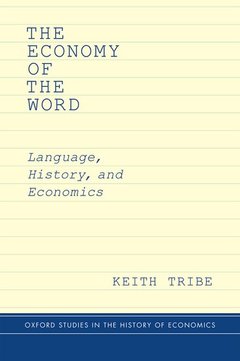Description
The Economy of the Word
Language, History, and Economics
Oxford Studies in History of Economics Series
Author: Tribe Keith
Language: English
Subject for The Economy of the Word:
Approximative price 117.78 €
In Print (Delivery period: 21 days).
Add to cart
Publication date: 04-2015
352 p. · 16.3x23.5 cm · Hardback
352 p. · 16.3x23.5 cm · Hardback
Description
/li>Biography
/li>
It was only in the sixteenth century that texts began to refer to the significance of "economic activity"---of sustaining life. This was not because the ordinary business of life was thought unimportant, but because the principles governing economic conduct were thought to be obvious or uncontroversial. The subsequent development of economic writing thus parallels the development of capitalism in Western Europe. From the seventeenth to the twenty-first century there has been a constant shift in content, audience, and form of argument as the literature of economic argument developed. This book proposes that to understand the various forms that economic literature has taken, we need to adopt a more literary approach in economics specifically, to adopt the instruments and techniques of philology. This way we can conceive the history of economic thought to be an on-going work in progress, rather than the story of the emergence of modern economic thinking. This approach demands that we pay attention to the construction of particular texts, showing the work of economic argument in different contexts. In sum, we need to pay attention to the economy of the word. ^l The Economy of the Word is divided into three parts. The first explains what the term economy has meant from Antiquity to Modernity, coupling this conceptual history with an examination of how the idea of national income was turned into a number during the first half of the twentieth century. The second part is devoted to Adam Smith's Wealth of Nations, considering first the manner in which Smith deals with international trade, and then the way in which the book was read in the course of the nineteenth century. Part III examines the sources used by Karl Marx and Léon Walras in developing their economic analysis, drawing attention to their shared intellectual context in French political economy.
After doing his graduate work in the social and political sciences in Cambridge during the 1970s, Keith Tribe spent most of the first half of the 1980s in Germany studying the development of eighteenth-century German economics, and developing an interest in the work of Max Weber. During this period he was also a member of the Department of Economics at Keele University, where he taught until leaving university employment in 2002. Since then he has worked as a professional rowing coach and as a translator.
© 2024 LAVOISIER S.A.S.




